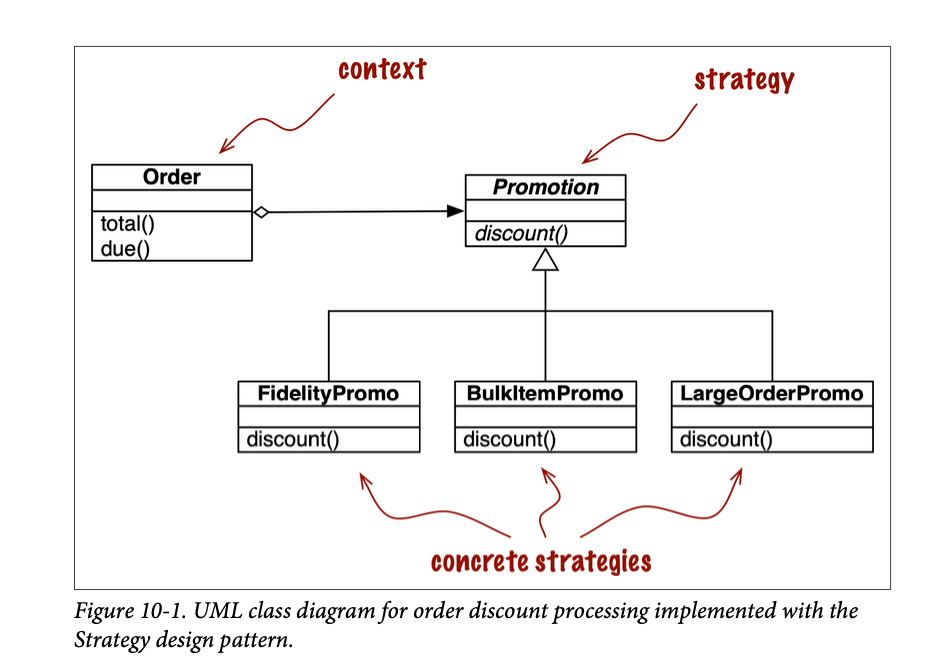Classic Strategy
Strategy Pattern is a good example that can be simplified using Python first-class functions.
Strategy Pattern
The Strategy pattern defines a family of algorithms, encapsulate each one, and make them interchangeable. Strategy lets the algorithm vary independently from clients that use it
One good example of Strategy applied in the e-commerce domain is “computing discounts to orders according to the customer’s attributes or the property of orders”. For example,
- Customers with more than 1000 fidelity score gets a global 5% discount
- A 10% discount is applied to each line item with 20 or more units in the same order
Orders with at least 10 distinct items get a 7% global discount.
- Context
- Provides a service by delegating some computation to interchangeable components that implement alternative algorithms.
- In ecommerce example, the context is an Order.
- Strategy
- The interface common to the components that implement different algorithms.
- In ecomomerce example, the role strategy is played by ABC Promotion
- Concrete Strategy
- Concrete subclass of Strategy
- FidelityPromo, BulkPromo, and LargeOrderPromo
- Concrete subclass of Strategy
Strategy Pattern Implementation with Classes
1
2
3
4
5
6
7
8
9
10
11
12
13
14
15
16
17
18
19
20
21
22
23
24
25
26
27
28
29
30
31
32
33
34
35
36
37
38
39
40
41
42
43
44
45
46
47
48
49
50
51
52
53
54
55
56
57
58
59
60
61
62
from abc import ABC, abstractmethod
from collections.abc import Sequence
from decimal import Decimal
from typing import NamedTuple, Optional
class Customer(NamedTuple):
name: str
fidelity: int
class LineItem(NamedTuple):
product: str
quantity: int
price: Decimal
def total(self) -> Decimal:
return self.price * self.quantity
class Order(NamedTuple): # Context
customer: Customer
cart: Sequence[LineItem]
promotion: Optional[Promotion] = None
def total(self) -> Decimal:
totals = (item.total() for item in self.cart)
return sum(totals, start=Decimal(0))
def due(self) -> Decimal:
if self.promotion is None:
discount = Decimal(0)
else:
discount = self.promotion.discount(self)
return self.total() - discount
class Promotion(ABC): # Strategy: an ABC
@abstractmethod
def discount(self, order: Order) -> Decimal:
"""Return discount as a positive dollar amount"""
class FidelityPromo(Promotion): # Concrete Strategy
def discount(self, order: Order) -> Decimal:
if order.customer.fidelity >= 1000:
return order.total() * 0.05
return Decimal(0)
class BulkItemPromo(Promotion): # Concrete Strategy
"""10% discount for each item with 20 or more units"""
def discount(self, order: Order) -> Decimal:
# Some logics here...
pass
class LargeOrderPromo(Promotion):
"""7% discount for orders with 10 or more distinct items"""
def discount(self, order: Order) -> Decimal:
# Some logics here...
pass
- An
Orderis a context which delegates promotion discount computation to specific Strategy (FidelityPromo, etc). Promotionis the strategy implemented with ABC.FidelityPromo, BulkItemPromo, LargeOrderPromoare concrete strategies.
Below is a sample usage of Order class with different promotions
1
2
3
4
5
6
7
8
9
10
11
jason = Customer("Jason Lee", 0)
andy = Customer("Andy Mac", 1100)
cart = (
LineItem('banana', 4, Decimal('.5')),
LineItem('apple', 10, Decimal('1.5')),
LineItem('watermelon', 5, Decimal(5))
)
Order(jason, cart, FidelityPromo()) # total: 42.00, due: 42.00
Order(andy, cart, FidelityPromo()) # total: 42.00, due: 39.90

